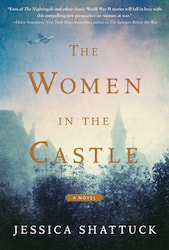
If you’ve read my reviews for any length of time, you’ll know how drawn I am to World War II literature. Something about the personal, political, and military dramas of that historical cataclysm have always held my rapt attention.
The Women in the Castle is ostensibly a World War II story, but it’s very different from many of the others. First, it’s not really directly about the war. It flashes back and forth between 1938 as the war’s beginning and 1945 (and beyond) after the war draws to a close. And second, it’s a story about Germans instead of British, French, or American characters. We rarely seem to get stories about the German people. The three women who are the subject, however, are widows of members of the German Resistance. Their husbands were killed in retribution for the failed assassination plot on Hitler in July of 1944. So it almost feels as if they were “Allies.”
What I enjoyed about this novel is that unique perspective of the three widows and how their lives were turned upside down when the Resistance failed in its attempt to stop Hitler. The stories of the three women, while intertwined, are also separated by the secrets in their pasts and what they don’t know about each other.
But I ultimately struggled to connect to the novel emotionally because of its structure. The chapters jump so often in chronology, and also among a fairly large cast of characters, that it never allowed me to be swept up by the human drama. The constant changes fragmented the three stories enough that I wasn’t as emotionally invested as I might have been with a more linear narrative. I kept having to remind myself who was whom, breaking up the power of the story for me.
That said, Shattuck almost had to break the chronology up to a degree because much of the story’s impact is the slow revelation of secrets. I suppose their impact is lost in a straight-forward telling of the story. So I don’t know how else one might have told this story.
The writing is tight and elegant. The themes are powerful. It’s a story of family, loyalty, guilt, and finally forgiveness. While I’m onboard with all of those elements, the fractured chronology, however, made it difficult for me to love it.
The Women in the Castle is ostensibly a World War II story, but it’s very different from many of the others. First, it’s not really directly about the war. It flashes back and forth between 1938 as the war’s beginning and 1945 (and beyond) after the war draws to a close. And second, it’s a story about Germans instead of British, French, or American characters. We rarely seem to get stories about the German people. The three women who are the subject, however, are widows of members of the German Resistance. Their husbands were killed in retribution for the failed assassination plot on Hitler in July of 1944. So it almost feels as if they were “Allies.”
What I enjoyed about this novel is that unique perspective of the three widows and how their lives were turned upside down when the Resistance failed in its attempt to stop Hitler. The stories of the three women, while intertwined, are also separated by the secrets in their pasts and what they don’t know about each other.
But I ultimately struggled to connect to the novel emotionally because of its structure. The chapters jump so often in chronology, and also among a fairly large cast of characters, that it never allowed me to be swept up by the human drama. The constant changes fragmented the three stories enough that I wasn’t as emotionally invested as I might have been with a more linear narrative. I kept having to remind myself who was whom, breaking up the power of the story for me.
That said, Shattuck almost had to break the chronology up to a degree because much of the story’s impact is the slow revelation of secrets. I suppose their impact is lost in a straight-forward telling of the story. So I don’t know how else one might have told this story.
The writing is tight and elegant. The themes are powerful. It’s a story of family, loyalty, guilt, and finally forgiveness. While I’m onboard with all of those elements, the fractured chronology, however, made it difficult for me to love it.
 RSS Feed
RSS Feed
